Have you ever wondered why Ragdoll cats are so adored by their loyal owners? These gentle giants, with their captivating blue eyes and affectionate nature, have captivated the hearts of cat lovers worldwide. In this comprehensive guide, we delve into the enchanting world of ragdoll cat breeds, exploring their unique personality traits, physical features, care requirements, and much more. Prepare to be whisked away on a fascinating journey as we uncover the secrets behind this beautiful cat breed.
Key Takeaways
- Ragdoll cats are known for their affectionate nature and strong bonding capabilities with their owners, making them ideal for family environments.
- Proper care for Ragdolls includes regular grooming, maintaining a balanced diet, and ensuring ample exercise and playtime.
- These cats are intelligent and sociable, easily fitting into households and getting along well with children and other pets.
Ragdoll Cat Personality Traits
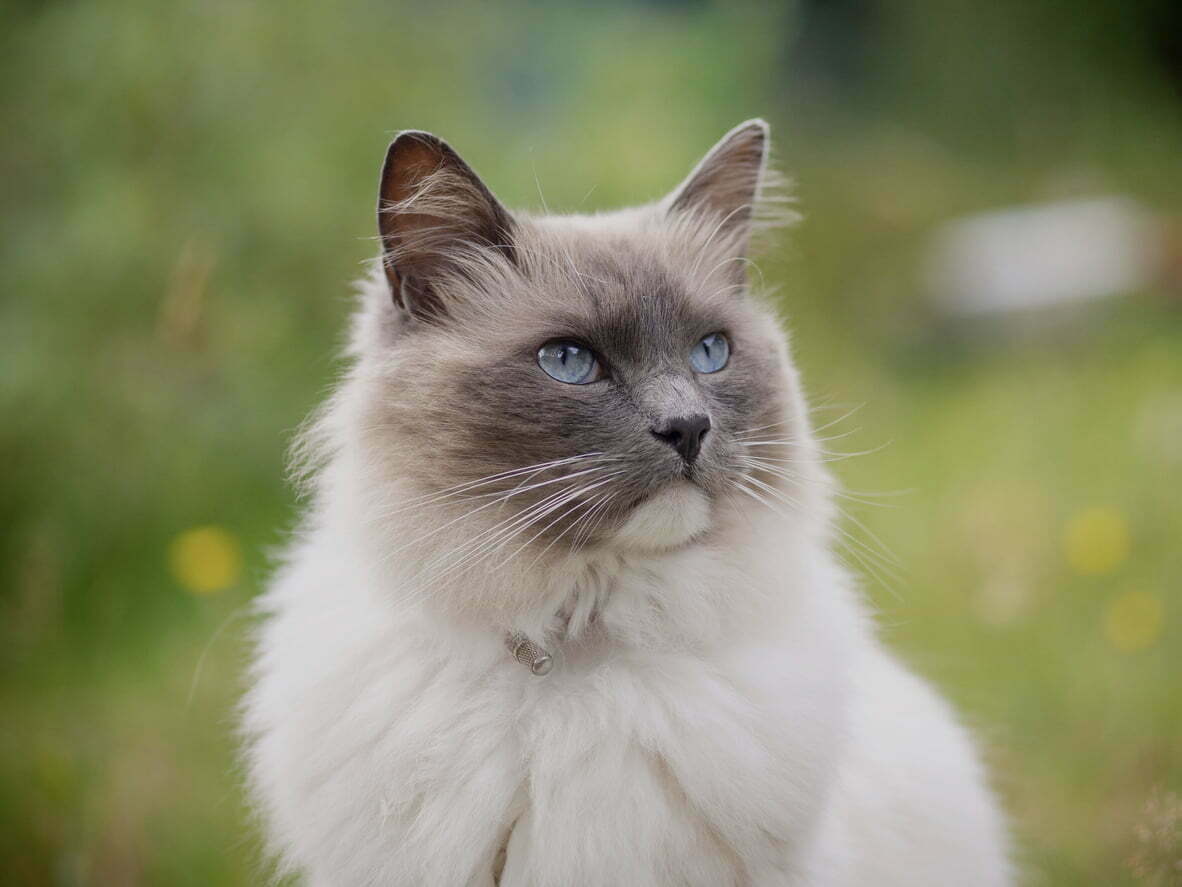
Ragdoll cats stand out among other breeds due to their calm, affectionate, and gentle temperament. They are known for their floppy nature, which has earned them the nickname “floppy cat.” In fact, Ragdoll kittens are often drawn to whatever captures their interest, yet they still take pleasure in human companionship and quality time spent together.
This loving personality, combined with their intelligence and sociability, makes them ideal pets for families with children and other animals.
Docile and Loving Nature
Ragdoll cats are renowned for their placid, gentle, and amiable disposition. They are frequently referred to as “lap cats” due to their tendency to become limp when held, signifying their complete trust in their owner. Their docile nature makes them the perfect companions for those seeking a tranquil and caring cat.
Interestingly, Ragdoll cats are very quiet, with a soft and soothing purr that can vary in intensity from one cat to another. This adds to their overall gentle and loving demeanor, making them an ideal pet for those who appreciate serenity and peace in their home.
Sociable and Family-Friendly
Ragdoll cats are known for their sociable and family-friendly nature. They require companionship and are not suited to living alone. This makes them an ideal choice for families, particularly those with children, as Ragdoll cats are usually very patient and gentle with kids.
However, it is important to note that, like any cat, Ragdoll cats may display signs of distress if left unattended for extended periods. These signs may include marking, vomiting, vocalizing, or exhibiting aggressive behavior. Therefore, ensuring ample quality time spent together is crucial for maintaining a happy and healthy relationship with your Ragdoll cat.
Independent yet Playful
While Ragdoll cats are known for their independent nature, they also possess a playful side, especially when they are kittens. Their playfulness is typically gentle in nature, as they do not often extend their claws. This combination of independence and playfulness makes them an attractive option for those seeking a low-maintenance yet interactive pet.
Ragdoll cats are known for their intelligence and trainability, making them adaptable to various activities and games. They even respond well to clicker training and positive reinforcement, often engaging in activities such as playing fetch. This versatility ensures that Ragdoll cats remain a delightful and entertaining companion throughout their lives.
Physical Features of Ragdoll Cats
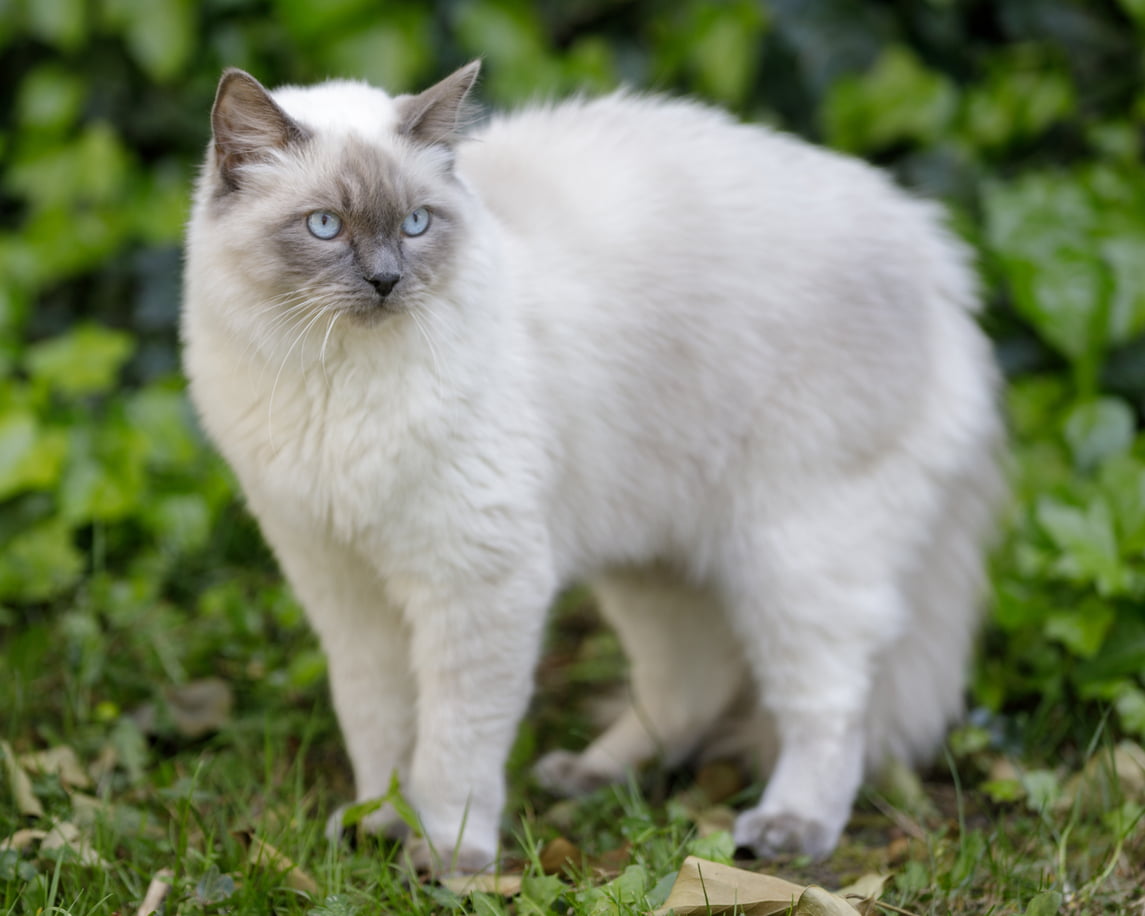
Ragdoll cats are large and heavy, with males weighing 15-20 pounds and females weighing 10-15 pounds. Their coats come in a variety of colors and patterns, including seal, chocolate, blue, lilac, red, and cream, with pointed patterns like colorpoint, mitted, bicolor, and van.
They require moderate upkeep with brushing once or twice a week to remove tangles and loose hair.
Size and Weight
As one of the largest cat breeds, Ragdoll cats boast an impressive size and weight. Males usually weigh around 15 to 20 pounds. Females are typically lighter, in the range of 10 to 15 pounds. Their size often earns them the nickname “gentle giants,” as their calm nature perfectly complements their large stature.
It is worth noting that Ragdoll cats reach their full size at approximately four years of age. This delayed development is a unique characteristic of the breed and contributes to their overall charm and appeal.
Coat Colors and Patterns
Ragdoll cats are known for their diverse range of coat colors and patterns. They can be found in colors such as seal, chocolate, blue, lilac, red, and cream, with pointed patterns including colorpoint, mitted, bicolor, and van. These striking patterns not only make them visually stunning but also contribute to their overall allure as a breed.
The coloration of Ragdoll cats advances gradually, and it may take up to two years for some color patterns to be completely developed. This slow progression of coloration is another unique feature of the breed, adding an element of mystery and charm to these beautiful cats.
Development of Coloration
The Ragdoll cats exhibit a distinct coloration. This is because of a genetic mutation that influences the enzyme in the pathway between tyrosine and pigmentation, which is sensitive to temperature. This temperature sensitivity is responsible for the gradual development of the Ragdoll’s coat color.
As the cat matures, the coloration of their coat slowly becomes more pronounced, with some patterns taking up to two years to fully develop. This fascinating aspect of the breed further adds to their unique charm and appeal.
Caring for Your Ragdoll Cat
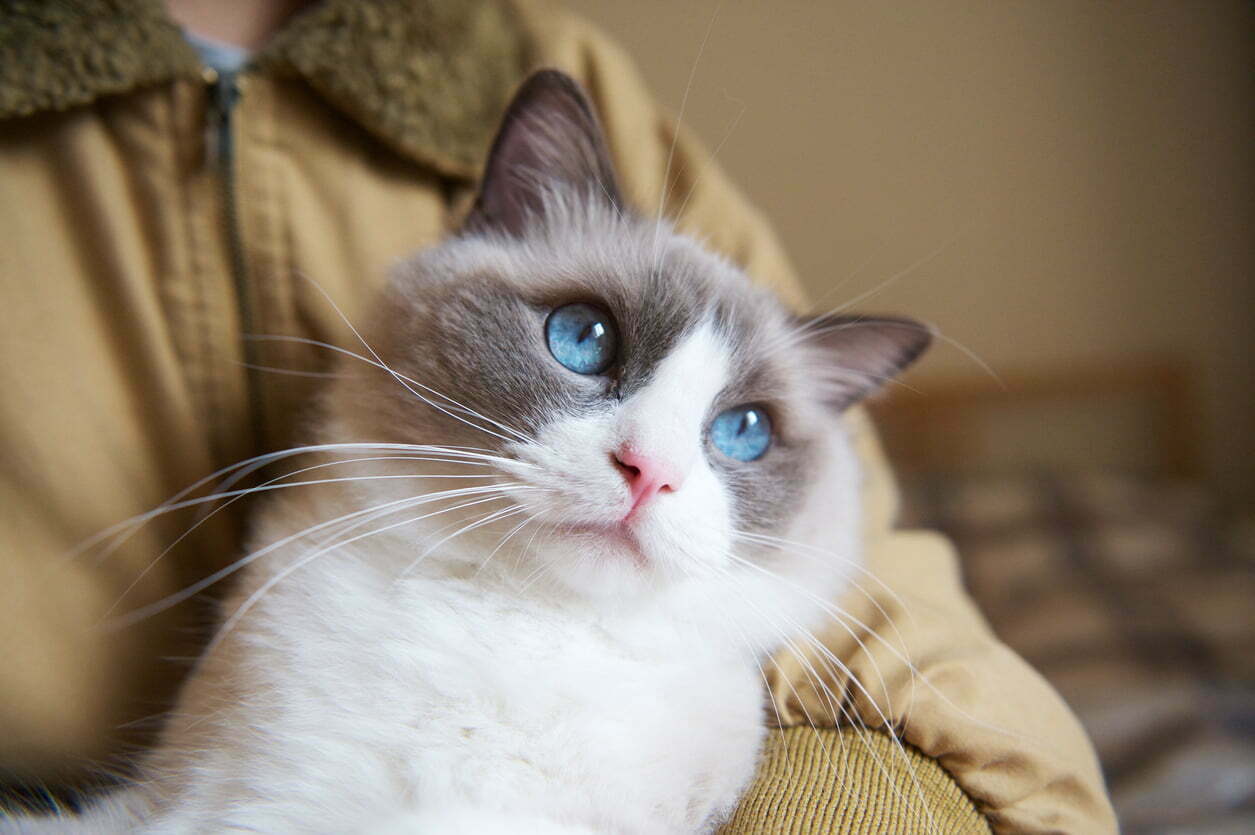
To ensure your Ragdoll cat lives a happy and healthy life, it is essential to provide them with proper care, which includes regular grooming, a balanced diet, and plenty of exercise and playtime.
In this section, we will explore the various aspects of Ragdoll cat care to help you provide the best possible environment for your feline friend.
Grooming Requirements
Ragdoll cats have semi-long fur, which necessitates grooming at least twice a week to maintain its neat and detangled state. Regular brushing not only helps to keep their fur healthy and beautiful but also reduces the risk of hairballs and other related health issues.
In addition to brushing, it is essential to trim your Ragdoll cat’s nails regularly to prevent overgrowth and potential injury. Providing your cat with a quality scratching post can also help keep their nails in good condition and satisfy their natural urge to scratch.
Diet and Nutrition
A nutritious diet is crucial for maintaining the health and well-being of your Ragdoll cat. Collaborating with your veterinarian to create a diet suitable for the age and activity level of your Ragdoll is highly recommended. It is also essential to maintain a balance between dry and wet food, as a diet that is too dry can lead to health issues such as bladder stones.
To prevent obesity and other health issues, it is important to portion out your Ragdoll cat’s daily food and schedule meals to ensure a consistent daily food intake. Providing puzzle feeders and toys can also help keep your cat mentally stimulated and encourage healthy eating habits.
Exercise and Playtime
Regular exercise and playtime are essential for maintaining the physical and mental well-being of your Ragdoll cat. Engaging your cat in games and physical activity not only helps to keep them fit and healthy but also strengthens the bond between you and your feline companion.
To keep your Ragdoll cat entertained and engaged, consider providing them with a variety of toys, such as puzzle feeders and interactive toys. In addition to toys, providing your cat with a scratching post and other furniture designed for cats can help to satisfy their natural instincts and keep them happy and content.
Health Concerns and Lifespan
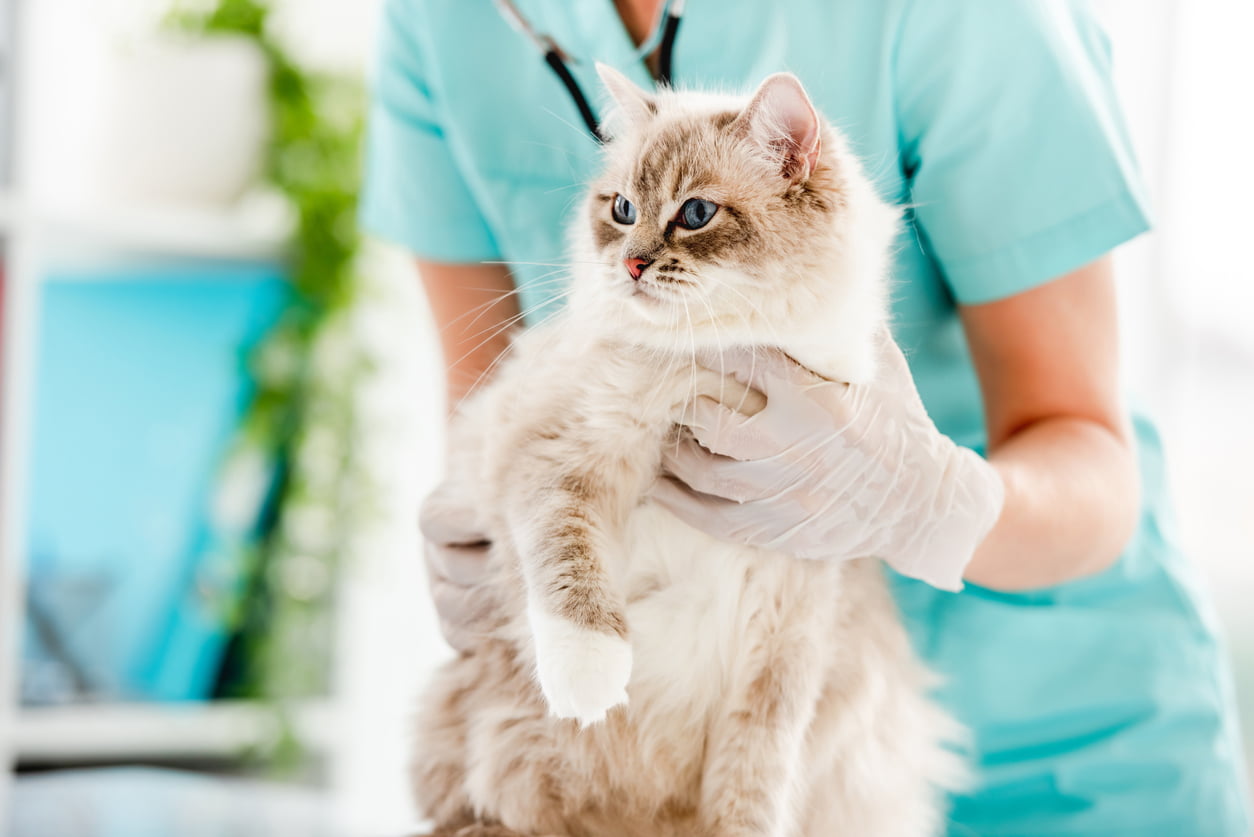
Like any breed, Ragdoll cats have certain genetic predispositions and common health problems that owners should be aware of. In this section, we will discuss these health concerns and provide information on the average lifespan of Ragdoll cats when they are from health-tested parents.
Ragdoll cats are generally healthy, but they can be prone to certain genetic conditions. These include hypertrophic cardiomyopathy (HCM), polycystic kidney disease (PKD), and hip dysplasia.
Genetic Predispositions
Ragdoll cats are predisposed to certain genetic conditions, such as hypertrophic cardiomyopathy (HCM) and polycystic kidney disease (PKD). Hypertrophic cardiomyopathy is a prevalent cardiac disorder among felines, with Ragdolls being particularly susceptible to it. Polycystic kidney disease is another genetic disorder that affects Ragdoll cats, characterized by the formation of cysts in the kidneys, which can lead to kidney failure.
It is crucial for potential Ragdoll owners to be aware of these genetic predispositions and to seek testing for their cats to detect these conditions early in life. Early detection and appropriate veterinary care can help to manage these conditions and improve the overall health and well-being of your Ragdoll cat.
Common Health Problems
In addition to genetic predispositions, Ragdoll cats also face common health problems such as obesity, urinary tract infections, hairballs, polycystic kidney disease, and hypertrophic cardiomyopathy. To help prevent these issues, it is essential to provide your Ragdoll cat with a nutritious diet, regular exercise, and routine veterinary examinations.
Bladder stones are another health concern for Ragdoll cats, which may be caused by a diet that does not adequately hydrate them and an excessive accumulation of minerals in the body. Ensuring your cat consumes ample amounts of fresh water and discussing their diet with a veterinarian can help prevent this issue.
Average Lifespan
Ragdoll cats are known for their long lifespans, with an average of 13 to 18 years. However, with appropriate care and vigilance, they can live up to 20 years or more. Factors that can impact the lifespan of a Ragdoll cat include diet, exercise, genetics, and environment.
By providing your Ragdoll cat with a nutritious diet, ample exercise, routine veterinary examinations, and a secure environment, you can help to ensure a longer and healthier life for your feline companion.
Ragdoll Cats and Outdoor Life
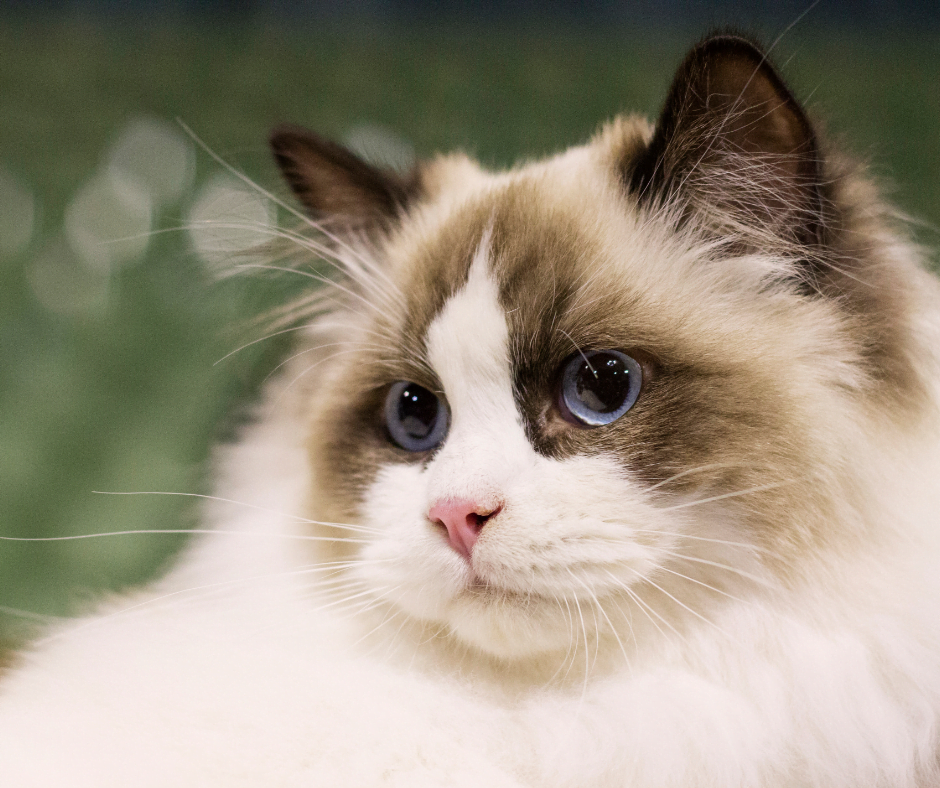
Ragdoll cats’ gentle and affectionate temperament makes them vulnerable to dangers outside, including exposure to disease and being stolen.
In this section, we will discuss the importance of providing safe outdoor spaces and leash training for Ragdoll cats to enjoy supervised outdoor time while minimizing potential risks.
Vulnerability to Dangers
Given their gentle and affectionate temperament, Ragdoll cats are vulnerable to potential risks outside, such as exposure to disease and the possibility of being stolen. They may also be at risk of entering hazardous areas, such as busy roads, construction sites, and other potentially hazardous locations.
In addition to these dangers, Ragdoll cats may be susceptible to attacks from other animals, including dogs, cats, and wild animals. Therefore, it is imperative to keep your cat away from these animals and monitor them carefully when they are in close proximity.
Safe Outdoor Spaces

To ensure the safety of your Ragdoll cat while outdoors, it is recommended to provide them with a secure outdoor space, such as a fenced-in garden or a secure catio. Constructing a cage is an ideal solution for providing a secure outdoor environment for Ragdoll cats, as it prevents them from digging and escaping.
In addition to providing a secure space, it is also essential to choose appropriate flooring for your outdoor area. Stone, grass, or wooden floors are suitable alternatives, while dirt should be avoided to minimize the risk of your cat digging and escaping.
Leash Training
Leash training Ragdoll cats can offer physical exercise, mental stimulation, socialization prospects, and aid in diminishing play-related incidents. The recommended approach for leash training Ragdoll cats is to train them slowly and with positive reinforcement, starting with brief walks in a tranquil area and rewarding them with treats.
When leash training Ragdoll cats, it is important to ensure that the cat is wearing a secure harness and that the leash is not excessively long. Additionally, it is essential to be cognizant of potential hazards in the environment, such as other animals or traffic, to ensure the safety of your feline companion during outdoor adventures.
Choosing a Ragdoll Cat
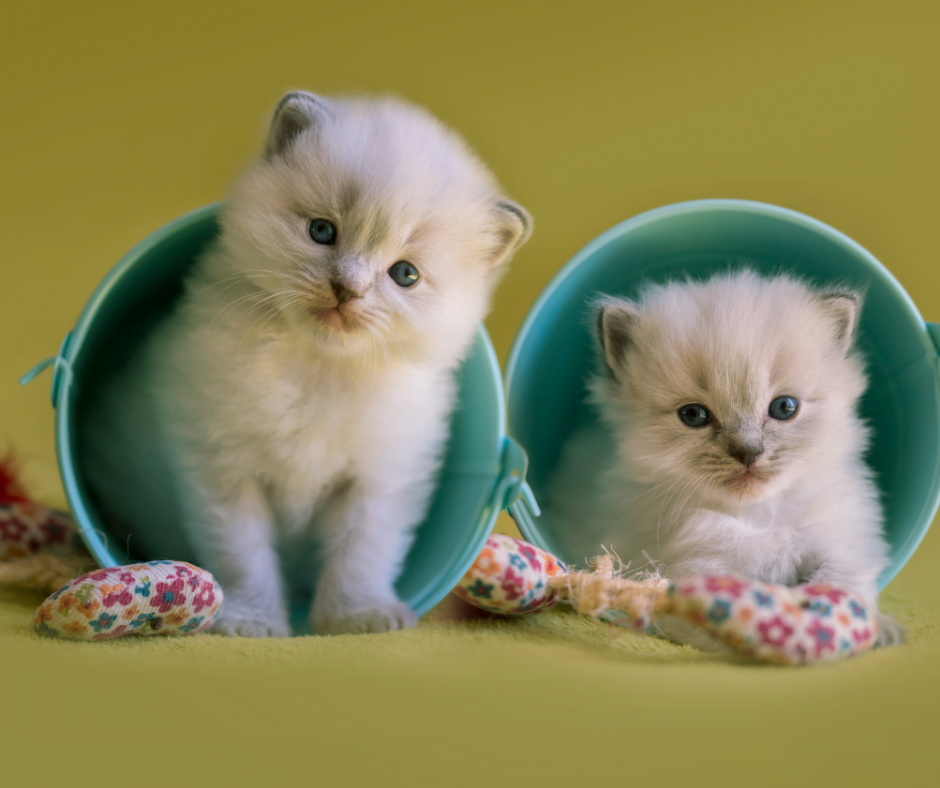
Adopting a Ragdoll cat is recommended over buying from a breeder, as it is often more economical and provides a home for a cat in need.
In this section, we will discuss the options for adopting a Ragdoll cat, buying from a breeder, and rescuing a Ragdoll cat in need of a loving home.
Adoption vs. Buying from a Breeder
Adopting a Ragdoll cat can be a rewarding experience, as it not only saves a life, but also provides you with a loving and affectionate companion. The adoption process typically involves researching local rescue organizations, completing an adoption form, and meeting the cat in person.
On the other hand, buying a Ragdoll kitten from a breeder allows you to choose a cat with specific attributes and characteristics, and you can be confident that the kitten is in good health and has been properly cared for.
When deciding between adopting a Ragdoll cat and purchasing one from a breeder, it is important to weigh the pros and cons of each option. Adoption usually costs less than purchasing from a breeder, but you may not know the cat’s history or health status. Purchasing from a breeder can be more expensive, but you have the opportunity to select a cat with specific traits and characteristics.
Evaluating Breeders and Catteries
If you decide to purchase a Ragdoll kitten from a breeder, it is essential to evaluate the breeder and cattery carefully. Look for breeders who are registered with a cat association and willing to provide documentation of any genetic testing that has been conducted. It is also crucial to visit the cattery and meet the parents and kittens in person to ensure they are healthy and well cared for.
When selecting a Ragdoll breeder, consider their experience, reputation, and commitment to the health and well-being of their cats. A reputable breeder will be open to answering any questions you may have and will provide you with the necessary documentation of the parents, including their medical history and immunization status.
Rescuing a Ragdoll Cat
Rescuing a Ragdoll cat can be a rewarding and fulfilling experience, as you provide a loving home to a cat in need. In addition to the emotional benefits, rescuing a Ragdoll cat is often more economical than purchasing one from a breeder. Ragdolls are great family pets. They can be adopted from rescues for as little as $200. Re-homing fees may also be lower depending on the circumstances.
To rescue a Ragdoll cat, you will need to research local rescue organizations, complete an adoption form, and meet the cat in person. Keep in mind that when adopting a Ragdoll cat, you may not know the cat’s history or health status, so it is essential to have a thorough veterinary examination upon adoption to ensure the cat’s well-being.
Understanding Ragdoll Cat Behavior
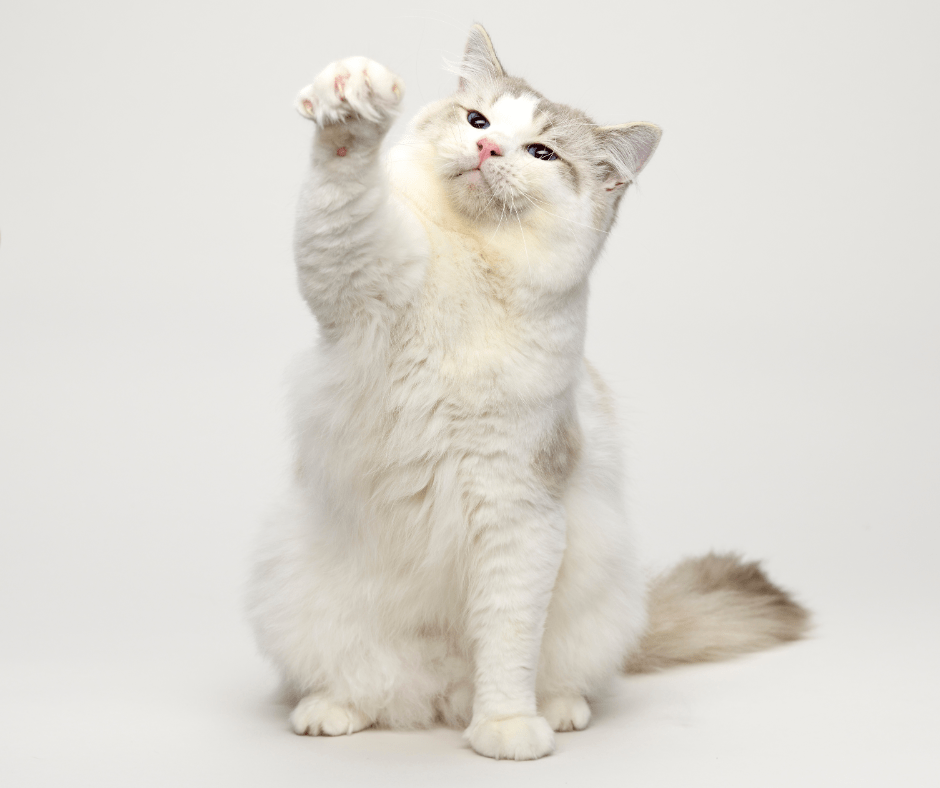
Ragdoll cats are not only beautiful but also possess a unique combination of affection, intelligence, and trainability. In this section, we will explore the various aspects of Ragdoll cat behavior, including their interactions with children and other pets.
How to best care for them to ensure a harmonious relationship with your feline companion is also important. With the right care and attention, Ragdoll cats can be a wonderful addition to any family.
Affection and Attachment
Ragdoll cats are known for their strong affection and loyalty towards their owners, often forming a special bond with a single individual. This deep connection can make them an ideal pet for those seeking a loving and devoted companion. Their affectionate nature extends to their interactions with other family members and pets, making them a popular choice for families.
Their loyalty and attachment can sometimes be seen as dog-like, as they may follow their owners from room to room and even greet them at the door when they return home. This endearing behavior further solidifies the special bond between Ragdoll cats and their owners.
Intelligence and Trainability
Ragdoll cats are known for their above-average intelligence, making them a pleasure to interact with. They are highly social and can be trained to achieve excellent results, making them adaptable to various activities and games. They respond well to clicker training and positive reinforcement, which can help strengthen the bond between you and your Ragdoll cat.
In addition to their intelligence, Ragdoll cats are also quite trainable, making them a popular choice for those seeking a low-maintenance yet interactive pet. By understanding their unique temperament and abilities, you can provide your Ragdoll cat with the mental stimulation and socialization they need to thrive.
Interaction with Children and Other Pets
Ragdoll cats are generally good with children and other pets, making them an excellent choice for families. However, it is important to monitor interactions between young children and Ragdoll cats to ensure the safety and well-being of both the child and the cat.
By understanding and respecting your Ragdoll cat’s temperament and boundaries, you can create a harmonious and loving environment for your entire family.
Summary
In conclusion, the enchanting Ragdoll cat breed offers a unique combination of beauty, affection, intelligence, and adaptability. Their gentle and loving nature makes them ideal companions for families and individuals alike. By understanding their unique characteristics, providing proper care, and fostering a strong bond, you can ensure a long-lasting and rewarding relationship with your Ragdoll cat. So, are you ready to welcome these gentle giants into your heart and home?
Frequently Asked Questions
What is special about Ragdoll cats?
Ragdoll cats stand out among other cat breeds for their sweet, easy-going personalities and loving nature. They are often described as loyal companions that crave human attention but aren’t overly demanding.
Ragdolls are gentle, intelligent, and affectionate, making them ideal pets for those looking for an attentive companion.
Is a Ragdoll cat expensive?
On average, a Ragdoll cat is likely to cost between $800 and $2000, depending on its quality, location, and if you are purchasing breeding rights. It is important to note that the demand for Ragdolls is high, so the price range may increase in some areas.
Ultimately, Ragdoll cats are relatively expensive, but can be worth it for those looking for a unique and beloved pet.
Are Ragdoll cats high maintenance?
From a grooming perspective, Ragdolls definitely require more care than other cats – their long coat needs regular brushing, and they should also be bathed regularly.
Considering this, Ragdoll cats are indeed considered to be quite high-maintenance.
Do Ragdoll cats like to be held?
Yes, Ragdoll cats love to be held. They tend to go limp and relax when held, living up to their name’s description of being just like a rag doll in the arms of its owner.
It is likely that your Ragdoll cat will become an affectionate cuddle buddy if given the chance.
Are Ragdolls hard to take care of?
Overall, Ragdolls are quite low-maintenance cats that don’t require much in terms of special care. They need regular brushing, nail trimming, and the same basic care that all cats require, like good nutrition and dental hygiene, but they are otherwise not difficult to look after.
